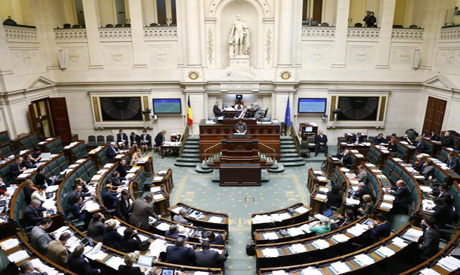
A file photo of the Belgian parliament in Brussels (Photo: Reuters)
The parliament in Belgium's Wallonia region on Wednesday banned the slaughter of animals without first stunning them despite opposition from Jewish and Muslim communities defending their rituals.
With 66 votes for and three abstentions, the parliament in Namur, the main city of southern French-speaking Wallonia, adopted a ban that will generally take effect in June 2018, though ritual slaughter will be exempted until September 2019.
The ban on slaughter without first stunning or anaesthetising the animals does not apply to imports of kosher or halal meat into the Wallonia region.
Animal rights activists from groups like GAIA pushed for the ban which violates both kosher and halal ritual slaughter where the animals are required to be conscious when their throats are slit.
The three abstentions were from the radical leftist PTB party, according to a vote tally on the parliament's website.
Brussels-based European Jewish Association spokesman Alex Benjamin told AFP just before the vote that the Wallon parliament's adoption of the legislation plays "into certain hands" at a time of a rising populist right.
"Either unwittingly or wittingly, it has a negative effect. It sends a signal to the Jewish population here... that we don't really respect you or your practices."
He said there is no scientific evidence that kosher slaughter is less humane than other practices.
"There's no nice way of taking an animal's life," Benjamin said.
Belgium's Jewish population is estimated at 40,000 people, with most in the port city of Antwerp and few in southern Wallonia.
Benjamin said the ban will affect the slaughter of about 100 animals a year.
The Executive of Belgium's Muslims, which represents the country's estimated 600,000 to 800,000 Muslims, on Monday voiced "serious doubts" over the law's compatibility with the free exercise of religious rituals."
The parliament in Belgium's northern Dutch-speaking region of Flanders is gearing up to adopt a similar ban from January 2019.
Short link: